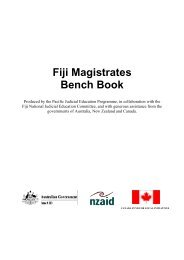Tuvalu Island Courts Bench Book - Federal Court of Australia
Tuvalu Island Courts Bench Book - Federal Court of Australia
Tuvalu Island Courts Bench Book - Federal Court of Australia
Create successful ePaper yourself
Turn your PDF publications into a flip-book with our unique Google optimized e-Paper software.
Previous convictions<br />
The prosecution will show the <strong>Court</strong> any previous criminal convictions that the accused has.<br />
This guides you in assessing the sentence by helping you to assess the previous character and the<br />
likelihood <strong>of</strong> the <strong>of</strong>fender re-<strong>of</strong>fending.<br />
The Chief Justice in Tasi Togiga v R (HC 8/03) stated that it is fundamental that a <strong>Court</strong> should<br />
be told <strong>of</strong> any previous convictions before determining the appropriate sentence – it is vital that<br />
the <strong>Court</strong> is aware <strong>of</strong> the fact that the <strong>of</strong>fender has no convictions when that is the case.<br />
You must ensure that the list <strong>of</strong> convictions are shown to the <strong>of</strong>fender.<br />
• If the <strong>of</strong>fender accepts these are correct, then you can proceed to consider them.<br />
• If the <strong>of</strong>fender disputes these, the prosecution will need to obtain evidence to support the<br />
conviction/s. It is the duty <strong>of</strong> the prosecution to provide that evidnece – a <strong>Court</strong> can only<br />
pass sentence on the strength <strong>of</strong> the evidence produced. It cannot rely on evidence that<br />
they might know but has not been produced.<br />
A particular problem in <strong>Tuvalu</strong> is the fact that a person may be known by more than one name.<br />
A careful check needs to be made to ensure that the record <strong>of</strong> convictions relates to the <strong>of</strong>fender.<br />
In assessing previous convictions you have to be aware <strong>of</strong> the result, and effect <strong>of</strong> a previous<br />
sentence. If, for example, a person is convicted <strong>of</strong> being drunk and disorderly and has a similar<br />
<strong>of</strong>fence in 1986, this is a one-<strong>of</strong>f as he or she has been <strong>of</strong> good behaviour for many years. This<br />
may to reduce the sentence to be given.<br />
If that person is involved in a similar incident later in the year, then the <strong>Court</strong> may deal with him<br />
or her with a greater penalty.<br />
See also Logologo Viliamu v R [2003] TVHC 9, 2/03.<br />
Rehabilitation <strong>of</strong> Offenders Act 1991<br />
The Rehabilitation <strong>of</strong> Offenders Act 1991 prevents a person from being punished twice for the<br />
same <strong>of</strong>fence. It provides that when a certain time period has passed, these can be regarded as<br />
‘spent’. This means that the <strong>Court</strong> must not take notice or base their decision on these.<br />
The <strong>Court</strong> should note whether there has been an incident in the past <strong>of</strong> a similar type, and if so,<br />
how long ago it was.<br />
This is an extremely important rule and will apply where there are minor <strong>of</strong>fences, such as<br />
alcohol-related crimes and traffic convictions.<br />
Further, where disqualification from driving has taken place, a <strong>Court</strong> must disregard <strong>of</strong>fences<br />
before the ban was imposed in assessing a further sentence.<br />
You will need to identify which <strong>of</strong> the <strong>of</strong>fences are spent (in the absence <strong>of</strong> legal assistance).<br />
<strong>Tuvalu</strong> <strong>Island</strong> <strong><strong>Court</strong>s</strong> <strong>Bench</strong> <strong>Book</strong> June 2004
















